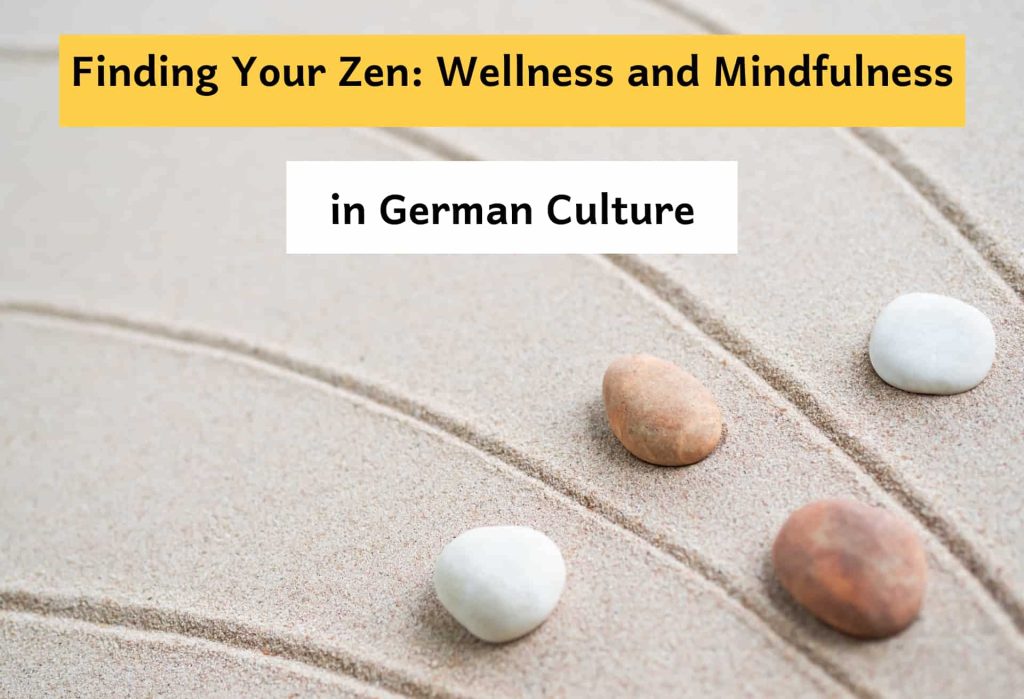
In the bustling streets of Germany’s many cities, a unique blend of wellness and mindfulness thrives – but how deeply is this woven into the fabric of German culture? Germany, a land renowned for its precision and efficiency, also harbors a rich tradition of finding balance and tranquility. Imagine a culture where the rigorous efficiency of daily life coexists harmoniously with a deeply rooted appreciation for relaxation and inner peace.
Did you know that Germany is home to over 900 hotels and boasts some of the most visited spas in Europe? This fusion of active lifestyle and mindful relaxation forms the cornerstone of what many seek in their quest for mindfulness.
Let’s jump straight into the fascinating ways in which Germany embraces Zen, uncovering how Zen values and mindfulness are not just practices but a way of life.
Historical Roots of Zen and Mindfulness in Germany
The journey of wellness and mindfulness in Germany is rich and deeply rooted in history, reflecting a blend of ancient traditions and evolving cultural practices. Here’s how these concepts have historically developed:
- Ancient Roman Influence: Germany’s foray into mindfulness journey can be traced back to the time of the Romans, who built luxurious baths and spas across the region. These were not just centers for hygiene but also social hubs, emphasizing the importance of relaxation and social well-being.
- Medieval Monastic Medicine: In the Middle Ages, German monasteries played a crucial role in promoting wellness. Monks and nuns used herbal remedies and emphasized the balance of body and spirit, laying the groundwork for holistic health approaches.
- 19th Century Health Movement: The 1800s saw a surge in ‘Naturheilkunde’ or natural medicine, with figures like Sebastian Kneipp popularizing hydrotherapy and herbal medicine. This era marked a shift towards preventative health and the holistic treatment of the body.
Also read: 10 Reasons Why Moving to Germany Might Be the Next Best Thing
Integration of Nature and Zen into Germany’s Culture
The integration of nature in German wellness is particularly noteworthy. Nature has always been a sanctuary for Germans, a place for rejuvenation and reflection. The concept of ‘Waldeinsamkeit,’ meaning the feeling of being alone in the woods, encapsulates the German reverence for nature’s healing power. Forests, mountains, and natural springs have been, and continue to be, vital elements in Germany’s mindfulness landscape.
Mindfulness in Germany has evolved alongside these practices. Initially rooted in religious and spiritual rituals, it has now permeated various aspects of life, blending traditional meditation techniques with modern mindfulness practices. This evolution signifies a deepening understanding and appreciation of the mind-body connection, a testament to Germany’s enduring commitment to holistic well-being.

Current Trends in Wellness and Zen Practices in Germany
In modern Germany, wellness practices have evolved to blend traditional approaches with contemporary trends, offering a diverse spectrum of options for those seeking physical and mental well-being.
Popular wellness practices in Germany today include a variety of holistic and integrative approaches. Yoga and meditation have gained significant popularity, appealing to those seeking mental clarity and physical agility. The use of saunas has also remained a staple in German wellness, with a focus on detoxification and relaxation. Additionally, the trend of ‘Waldbaden’ or forest bathing, inspired by Japanese Shinrin-Yoku, has become a favored way to immerse oneself in nature for therapeutic benefits.
Role of Spas, Retreats and Natural Landscapes in the German Zen Culture
- Spas: Germany’s spas, often located in picturesque settings, offer a range of services from thermal baths to aromatherapy, harnessing the power of water and natural elements for healing and relaxation.
- Retreats: Retreats in Germany that promote mindfulness provide immersive experiences, combining fitness activities, nutritional guidance, and mindfulness sessions, often in tranquil rural or mountainous locations.
- Natural Landscapes: The use of natural landscapes like the Black Forest, the Bavarian Alps, and the North Sea for wellness activities is prominent. These environments offer opportunities for hiking, cycling, and simply unwinding in nature’s embrace.
Impact of Wellness Practices in Germany
- Physical Health Benefits: Regular participation in these wellness activities contributes to improved cardiovascular health, stronger immunity, and better overall physical fitness.
- Mental Health Benefits: These practices also offer significant mental health advantages, including reduced stress, enhanced mood, and a greater sense of overall mental well-being. The mindfulness aspect, in particular, fosters a deeper connection with oneself and aids in cultivating a more balanced lifestyle.
- Improved Sleep Quality: Many of the wellness practices, especially those involving relaxation techniques like sauna visits, meditation, and forest bathing, have been linked to better sleep quality. These activities help in regulating the body’s natural sleep-wake cycle, leading to more restful and rejuvenating sleep.
- Enhanced Cognitive Function: Activities that combine physical movement with mindfulness, such as yoga and mindful walking in natural settings, have been found to boost cognitive functions. These practices can enhance concentration, memory, and overall brain health, contributing to better mental agility and productivity.
- Social Well-being and Community Connection: German wellness culture often involves community-based activities, such as group hikes, communal sauna sessions, and yoga classes. These social aspects of wellness practices foster a sense of belonging and community, enhancing social well-being and reducing feelings of loneliness and isolation.

You might be interested: Travelling in Germany on a Budget: 6 Important Things to Keep In Mind
Zen Culture in German Daily Life
In Germany, the concept of mindfulness extends beyond personal health and mindful practices, permeating various aspects of daily life including work, education, and family settings.
Incorporation in Work, Education, and Family Life
At work, many German companies are increasingly adopting mindfulness programs, recognizing their benefits in enhancing employee focus, reducing stress, and improving overall job satisfaction. In the realm of education, mindfulness is being integrated into school curricula to help students manage stress and improve concentration.
This approach is also evident in family life, where mindfulness practices are employed to strengthen familial bonds and enhance communication, with activities like mindful eating and shared meditation.
Influence of Traditional German Values
Traditional German values such as ‘Ordnung’ (order), ‘Gründlichkeit’ (thoroughness), and ‘Gemeinschaftsgefühl’ (community feeling) significantly influence mindfulness practices in the country. These values underscore the importance of being present, methodical, and connected with others, aligning well with the principles of mindfulness.
Zen in Everyday Settings
- Mindful Commuting: Many Germans practice mindfulness during their daily commute, using this time for quiet reflection or mindful breathing exercises.
- Nature Engagement: Regular walks or activities in natural settings like parks and forests are common, allowing individuals to connect with nature and practice mindfulness.
- Mindful Eating: Emphasizing the importance of enjoying meals without distractions, practicing mindful eating is a common practice in German households.
- Mini-Meditation Breaks: Incorporating short meditation or deep breathing sessions during the day, especially in stressful work environments, is a growing trend.
- Community Activities: Participating in community-based mindfulness activities, such as group yoga or meditation classes, reinforces the sense of connectedness and collective well-being.

The Role of Diet and Nutrition in German Zen Values
German cuisine, traditionally rich and hearty, has evolved to embrace a more balanced and health-conscious approach. Classic dishes like sausages, breads, and meats are now often complemented with a greater variety of fresh vegetables, whole grains, and lean proteins. This shift reflects a broader understanding of the importance of diet in overall wellness.
Connection Between Diet, Nutrition, and Wellness in Germany
- Holistic Health: There’s a growing recognition of how a balanced diet contributes to overall health and well-being.
- Preventive Medicine: Nutritious food is increasingly viewed as preventive medicine, helping to ward off illnesses.
- Mental Health Benefits: A balanced diet is linked to improved mental health, with a focus on foods that boost mood and cognitive function.
We think you might enjoy this: Transportation in Berlin: 10 Tips For When You Are Lost in the City
Organic and Sustainable Eating Trends
The trend towards organic and sustainable eating is gaining momentum in Germany. This shift is driven by a growing environmental consciousness and a desire for food quality and safety. Organic farming, local sourcing of produce, and ethical animal husbandry are key aspects of this trend.
Germans are increasingly seeking out farmers’ markets, organic food stores, and are even participating in urban gardening initiatives to access fresh, sustainable produce. This movement not only supports personal health but also contributes to environmental sustainability.

Integrating German Zen Culture and Mindfulness Practices in Your Life
Discover how to enrich your daily life by integrating German mindfulness practices. This section explores practical ways to adopt these holistic approaches for improved well-being.
Practical Tips for Incorporating German Wellness and Mindfulness Techniques
- Regular Sauna Sessions: Embrace the German tradition of regular sauna use to detoxify the body and relax the mind.
- Nature Immersion: Allocate time for activities like hiking, walking, or simply spending time in natural settings, akin to the German practice of ‘Waldbaden.’
- Mindful Eating Habits: Adopt the German approach to mindful eating by savoring meals slowly and without distractions.
Adopting Elements of German Culture for Personal Wellness
- Incorporate Herbal Remedies: Explore the use of traditional German herbal remedies for natural health care.
- Engage in Community Wellness Activities: Participate in community wellness programs like group fitness classes or meditation groups, reflecting the German emphasis on communal health.
- Balance Work and Relaxation: Emulate the German value of work-life balance by setting clear boundaries between professional and personal time.
Make sure to check this out: Nightlife in Germany: What Should Your Weekends in Germany Look Like?
Personalizing Wellness Practices to Fit Individual Needs
- Choose Activities That Resonate: Select wellness and mindfulness practices that align with your personal interests and lifestyle.
- Adjust Intensity and Duration: Tailor the intensity and duration of activities to your physical capabilities and time constraints.
- Reflect on Personal Wellness Goals: Regularly assess and adjust your wellness routine based on your evolving personal health and wellness goals.

A Wellness Wunder: The German Way
In wrapping up our journey through Germany’s unique wellness landscape, we’ve uncovered a world where traditional spas date back to Roman times and over 900 wellness hotels dot the country. It’s a place where mindfulness isn’t just a buzzword, but a daily practice, seamlessly integrated into work, education, and even family dinners.
This article has taken us through forest paths for ‘Waldbaden’ and into the heart of communal saunas, highlighting how a nation known for its efficiency also champions relaxation and mental clarity.
As you consider bringing a slice of German wellness into your life, remember it’s not just about adopting practices, but embracing a mindset – one that balances the vigor of life with the tranquility of the forest. So, why not try a bit of this German ‘Zen’ and see how a touch of ‘Waldeinsamkeit‘ (the feeling of being alone in the woods) can transform your daily routine?




